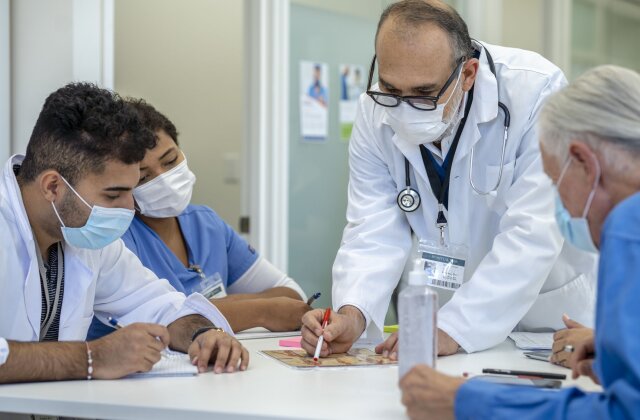Table of Contents
What is OMSAS?
OMSAS (Ontario Medical School Application Service) is the main application service that allows prospective students to apply to medical schools in Ontario. As a competitive and rigorous process, it is crucial to have a comprehensive understanding of OMSAS and its requirements to increase your chances of acceptance.
In this article, we aim to provide you with realistic and rare advice that goes beyond the basic information found in other sources. Our goal is to equip you with the knowledge and strategies necessary to stand out to the admissions committee.
We will cover various aspects of the OMSAS application, including the application cycle, required documents and application materials, as well as tips for writing impactful personal essays.
By familiarizing yourself with the application process and leveraging our unique insights, you can position yourself as a strong candidate in the highly competitive admissions cycle.
Click to see hundreds of consultants who can mentor you:
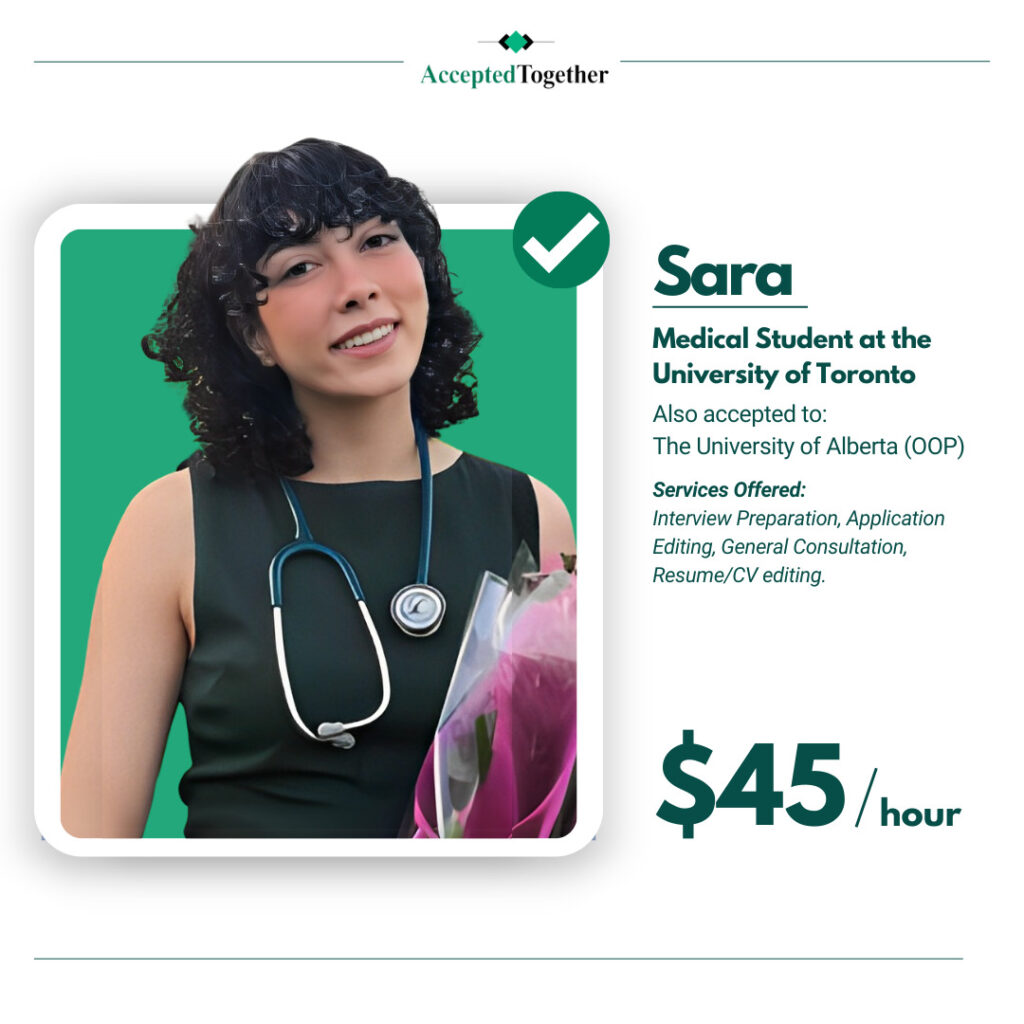
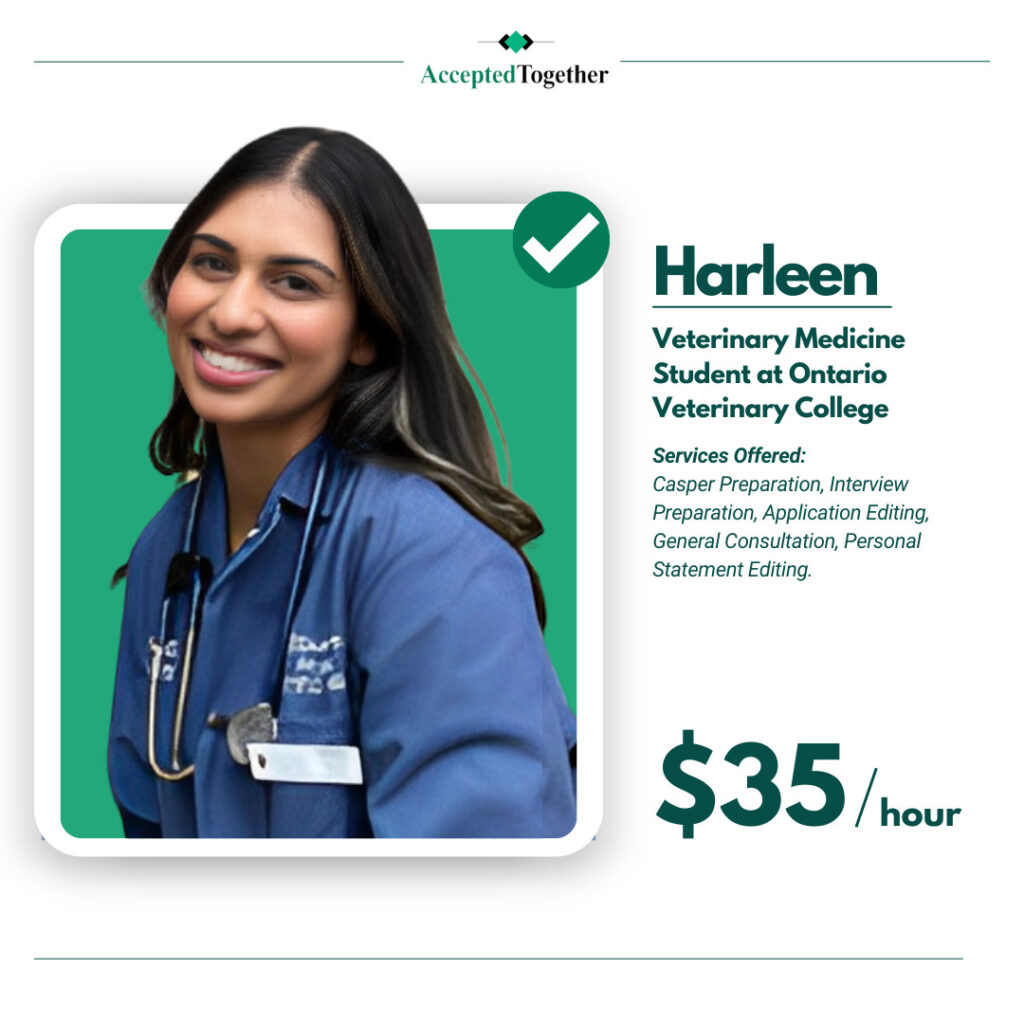
The Application Cycle

When it comes to the OMSAS application, understanding the application cycle is crucial. The OMSAS application opens early summer. It’s advisable to start working on your application well in advance to allow for any unforeseen circumstances or delays.
How Long Does It Take to Complete An Application?
On average, it takes applicants around 1-2 months to complete the entire application. However, it’s important to note that every individual’s timeline may vary.
To ensure a smooth and timely application process, it is advisable to start approaching your referees (CAF writers) at the beginning of the summer. This will give them ample time to write a strong letter of recommendation on your behalf.
When applying to medical school through OMSAS, you will need to provide various documents, such as transcripts, personal essays, and autobiographical (ABS) sketch descriptions. Gathering these materials and carefully crafting your personal statement can be a time-consuming task.
Remember, the OMSAS application is not just a formality. It is an opportunity to showcase your passion for a career in medicine and demonstrate your fit for the program. Take the time needed to ensure your application stands out to the admissions committee by highlighting your relevant skills and experiences, aligning with the CanMEDS framework, and addressing the values of the University of Toronto’s medical school.
What GPA is required?
Ontario medical schools have certain GPA requirements that applicants must meet to be considered for admission. The minimum GPA requirement varies from school to school, ranging from 3.0 to 3.7 on a 4.0 scale. It’s important to note that meeting the minimum GPA requirement does not guarantee acceptance, as medical schools consider various factors when evaluating applications.
To calculate your GPA for the Ontario Medical School Application Service (OMSAS), you can use the OMSAS GPA conversion calculator. Access the OMSAS GPA calculator by clicking here!
It’s also helpful to evaluate your academic performance in relation to the average accepted GPA scores at Ontario medical schools. You can find statistics on average accepted GPAs at Ontario medical schools and here are some examples:
Queen’s University stats: https://meds.queensu.ca/ – This one may surprise you! The average accepted GPA was in the 3.7’s for the most recent admitted class!
UofT medical school stats: https://applymd.utoronto.ca/admission-stats
McMaster medical school stats: https://ugme.healthsci.mcmaster.ca
For more information on GPA requirements and the application process for Ontario medical schools, visit the OMSAS website.
CanMEDS
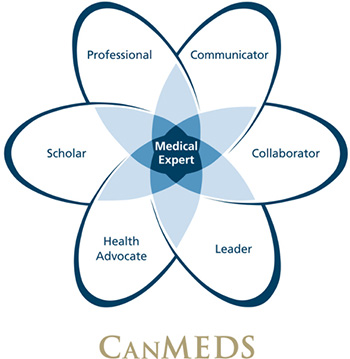
Source: https://www.royalcollege.ca
CanMEDS is a framework that outlines the competencies and qualities expected of medical professionals in Canada. It stands for Canadian Medical Education Directives for Specialists and was developed by the Royal College of Physicians and Surgeons of Canada. The CanMEDS framework consists of seven roles that medical professionals are expected to fulfill: Medical Expert, Communicator, Collaborator, Leader, Health Advocate, Scholar, and Professional.
These roles encompass the broad skillset required to provide comprehensive and patient-centered care. When preparing your OMSAS application for medical school, it is important to demonstrate your understanding and commitment to these CanMEDS roles.
Admissions committees value applicants who can showcase their abilities in each of these areas, as it reflects their potential to become well-rounded and competent physicians. Many also use the CanMEDS to score your application.
How To Show Them In A Balanced Way
When crafting your OMSAS application, it’s important to showcase your CanMEDS competencies in a balanced way. Here are some key strategies to help you do just that:
1. Personal Statement and Essays: Use your personal statement and essays to demonstrate examples of how you have applied CanMEDS competencies in your life. Instead of explicitly stating that you possess certain skills, weave them into your stories and experiences in a subtle and natural way.
2. Reflect on Relevant Experiences: Reflect on past experiences, such as volunteer work, research projects, or leadership roles, that showcase your CanMEDS skills. Choose examples that are meaningful and highlight different competencies to provide a well-rounded view of your abilities. For example, by describing an important an important committee you led, you demonstrate both the roles of leadership and collaboration.
3. Ask for Feedback: Solicit feedback from trusted mentors, professors, or colleagues to ensure you have effectively showcased your CanMEDS competencies without being too obvious or repetitive. Their perspective can help you refine your application and create a balanced portrayal of your skills.
Examples of Being Too Obvious
When crafting your OMSAS application, it is important to strike a balance between effectively showcasing your CanMEDS roles and providing compelling evidence to support them. Being too obvious or not providing enough depth can undermine the impact of your application. Here are two examples to avoid:
1. Explicit Statements: While it is crucial to highlight your CanMEDS roles, explicitly stating them without illustrating how you have embodied these roles can make your application appear superficial. For example, saying that you possess the “expert” role without describing a situation where you applied your knowledge and skills may not resonate well with the admissions committee.
2. Overemphasis on CanMEDS Roles: Although the CanMEDS framework is an essential aspect of your application, it is crucial not to solely focus on it at the expense of other important elements. Your application should showcase a well-rounded perspective of your experiences and achievements, highlighting how various aspects of your journey have shaped you as an individual and future physician. Don’t let the CanMEDS destroy your narrative!
💡Pro Tip: Overused buzzwords in OMSAS essays include “collaborate”, “lead”, and “advocate”. Try to brainstorm ways of demonstrating these qualities without explicitly writing them out. Reviewers often roll their eyes when seeing the word “collaborate” overused!
Click to see hundreds of consultants who can mentor you:
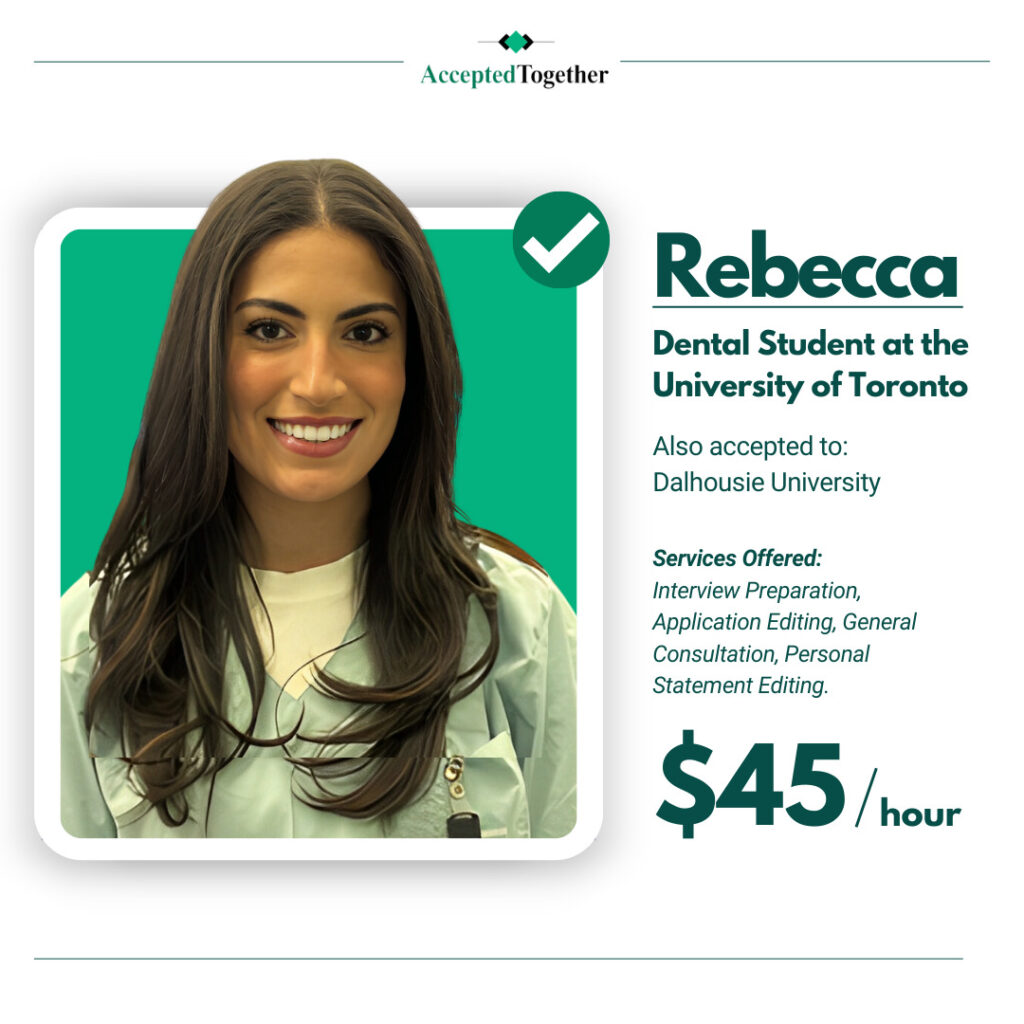
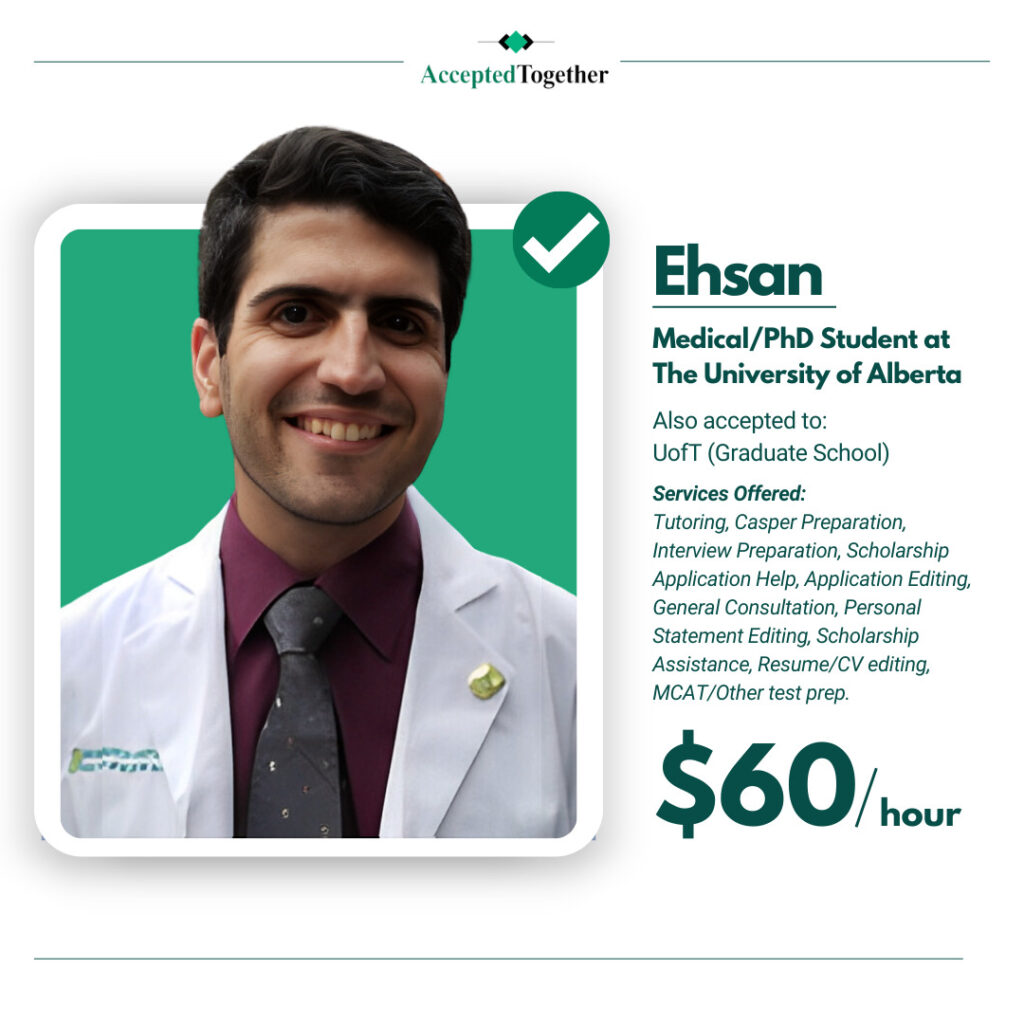
The Autobiographpical Sketch (ABS)

To see our comprehensive OMSAS ABS article, click here!
By carefully crafting your extracurricular activities into the Autobiographical Sketch, you can effectively convey your passion for medicine, highlight your CanMEDS roles, and demonstrate your suitability for a career in healthcare.
How To Condense Experiences Into 150 Characters
When completing the Autobiographical Sketch for the OMSAS application, condensing experiences into 150 characters can be a challenging task. However, with some strategic thinking, it is possible to effectively convey the essence of each experience.
Consider using concise language and avoiding unnecessary details. Use strong action verbs to convey your role and accomplishments. For example, instead of saying:
I volunteered at a local hospital where I assisted the hospital’s patients and supported hospital staff. Through the experience, I learned how to work under the stress and pressure required of me.
You could condense it to:
Assisted hospital patients and supported medical staff. Learned to work under pressure
Don’t be afraid to use shortcuts such as “&” instead of “and” but make sure that if you are using acronyms they are obvious ones that everyone is aware. Most people know what “CPR” is but many readers won’t know that “hTTP” stands for “hereditary thrombotic thrombocytopenic purpura”.
Remember, it is crucial to choose experiences that align with the CanMEDS roles and represent qualities of an ideal physician. While you don’t have to explicitly mention the CanMEDS roles in the experience description, ensure that the all selected experiences combined showcase them all.
Lastly, focus on describing what you did rather than solely emphasizing what you learned. The admissions committee wants to see your active engagement and impact, so highlight specific actions and outcomes achieved during each experience.
💡Pro Tip: During the ABS brainstorming process, we recommend using a spreadsheet that has a checklist with all CanMEDS listed. This way, you can check off CanMEDS as you are listing out experiences. You should at least cover each role once in the ABS portion of your OMSAS application!
What Experiences To Avoid
There are certain types of experiences that should be avoided, as they may have limited impact or demonstrate a lack of commitment or dedication. These experiences include:
1. Limited Impact: Brief experiences with minimal involvement or impact should also be avoided. For example, simply being a member of a club or attending events without actively contributing or taking on responsibilities may not demonstrate your true abilities or qualities as a future physician.
2. Lack of Commitment: Short-term or one-day events that do not highlight long-term commitment or dedication should be excluded. Admissions committees are interested in seeing experiences that demonstrate your sustained passion and commitment in a particular area.
3. Automatic Entrance Scholarships: Mentioning entrance scholarships that are purely GPA-based is often not very useful. Reviewers know that your grades are high (hence why they are doing the application review). Don’t make them read more than they have to!
Remember, quality is more important than quantity when selecting your experiences for the OMSAS application. Choose experiences that have had a significant impact, showcase your personal growth, and align with the CanMEDS roles.
Is There A Magic Number Of Experiences?
When it comes to your OMSAS application for medical school, one question that often arises is: is there a magic number of experiences that will guarantee acceptance? The truth is, the quantity of experiences is not as important as the quality and alignment with the CanMEDS roles.
The Autobiographical Sketch section of your application is designed to showcase your diverse experiences and involvement in activities that demonstrate your commitment to a career in medicine. However, it is crucial to remember that admissions committees are more interested in the impact and commitment shown in each experience, rather than the sheer number of experiences listed.
So, while there may not be a magic number of experiences, there is definitely a magic formula. Choose quality experiences that align with the CanMEDS roles and reflect your commitment to the profession, and you will be on your way to impressing the admissions committee at the University of Toronto MD program and other medical schools.
The Essays
To see our comprehensive OMSAS essays guide, click here!
In addition to the Autobiographical Sketch (ABS) section of the OMSAS application, medical schools like UofT, Schulich School of Medicine, and the Northern Ontario School of Medicine (NOSM) require additional essays to gain a deeper understanding of each applicant. The UofT ones are the most famous ones. These essays include the Brief Personal Essays (BPE) and the ABS essay.
The BPE asks two specific questions every year that allow you to reflect on high-level topics such as social issues, how the world changed since the pandemic, and other emerging issues. The ABS essay, on the other hand, asks you to reflect on specific experiences or activities that have impacted your personal and professional growth. The advice here will be general enough to apply to all the OMSAS essays!
The 2025 University of Toronto MD BPEs are:
1) In what way(s) are you a product of the world around you? How has it, or how will it, impact your journey in medicine?
2) Investor and philanthropist Charlie Munger is known for saying: “We all are learning, modifying, or destroying ideas all the time. Rapid destruction of your ideas when the time is right is one of the most valuable qualities you can acquire. You must force yourself to consider arguments on the other side.” Explore how this may affect a career in medicine.
We have a thorough guide about the UofT MD essays that you can access by clicking here!
How To Start The Essay?
The beginning sets the tone for the rest of your application and capturing the attention of the admissions committee is crucial.
Imagine you are a member of the committee, sifting through numerous applications, each containing personal statements and essays. How can you make yours stand out? The key lies in crafting an engaging introduction that instantly captures the reader’s attention.
One effective method is to begin with a compelling anecdote – a brief, real-life story that paints a vivid picture and connects with the reader on an emotional level. By allowing the committee to walk in your shoes and experience a pivotal moment, you forge an immediate connection that makes your essay memorable.
Alternatively, you could start with a thought-provoking question that challenges the status quo and prompts the reader to reflect deeply. This approach demonstrates your critical thinking skills and ability to engage in meaningful discourse, both of which are essential in the field of medicine.
When it comes to UofT MD essays, it is especially important to employ an attention-grabbing introduction. The UofT MD program emphasizes the development of well-rounded physicians, and demonstrating a good understanding of creating writing will show that. Starting your essay with a powerful introduction will make your application truly shine in the eyes of the admissions committee.
Incorporating A Narrative

When it comes to crafting a compelling personal statement for your OMSAS application, the power of storytelling cannot be underestimated. As a member of the admissions committee, imagine reading through countless essays day after day, searching for that one exceptional applicant who stands out from the crowd. These reviewers are constantly seeking an interesting and unique perspective that grabs their attention and keeps them engaged.
By incorporating a narrative structure into your personal statement, you not only create an engaging introduction but also maintain the committee’s interest throughout your essay. Narratives allow you to present a real-life story that showcases your growth, experiences, and goals, providing a personal touch that captivates the reader.
For instance, you can start with a vivid anecdote that illustrates a pivotal moment in your journey towards changing a core value or opinion. Let’s say that you were against abortions previously but changed that opinion after your friend decided to get one.By bringing the committee into your shoes as you describe how you changed you mind, you allow them to visualize the challenges you faced and the lessons you learned. This personal connection leaves a lasting impression and sets a strong foundation for the rest of your essay.
References/ Confidental Assessment Forms (CAF)
To read out comprehensive CAF referee guide, click here!
One crucial aspect of the OMSAS application process is obtaining strong references from individuals who can attest to your abilities, character, and potential as a future medical student. These references, in the form of Confidential Assessment Forms (CAF), play a vital role in showcasing your qualifications and suitability for medical school. It is important to carefully select individuals who can provide meaningful insights into your academic achievements, clinical experiences, extracurricular activities, and interpersonal skills. While it may be tempting to solely approach individuals who are academically renowned, it is equally important to seek references from individuals who have worked closely with you and can provide a comprehensive assessment of your abilities.
Who Would Make A Good Referee?
A good referee should not only be someone whom you have communicated with extensively but also someone who can speak to your growth and development over time. It is important to consider individuals who have a close understanding of your capabilities and can provide detailed insights into your qualities and characteristics. This could be a professor who you have worked closely with on a research project or a supervisor from a volunteer experience where you demonstrated strong leadership and interpersonal skills.
Having referees who can speak to your growth and development is especially valuable in demonstrating your potential as a future physician. They can provide examples of how you have approached challenges, overcome obstacles, and shown a commitment to continuous improvement. This gives the admissions committee a more holistic view of your abilities and potential in the medical field.
Who Would Not Make A Good Referee?
There are certain characteristics or circumstances that might make someone a poor choice as a referee.
Firstly, selecting someone who is unfamiliar with your work or personal attributes can undermine the effectiveness of the reference. A referee who cannot speak to your achievements or experiences may not be able to provide the necessary insights into your suitability for a career in medicine.
Secondly, lack of professionalism or reliability can also be red flags. Referees who are not responsive to emails or appear overly dry in their replies may not be invested in providing a strong and compelling reference on your behalf.
Another factor to consider is the availability of the referee. If they are unable or unwilling to dedicate the time and effort required to write a detailed reference, it can significantly diminish its impact.
Very often, students choose a professor that just taught them a course. That is the wrong approach! Even if you spoke to the professor a couple of times after class, they cannot really reflect on your attributes beyond the fact that you ask good questions.
What do you need to do?
When soliciting reference letters for your OMSAS application, there are a few key steps you need to take to ensure you receive strong and impactful recommendations.
To make the process smoother for your referees, provide them with your resume and a summary of the key experiences you would like them to reflect on. However, be sure to state that they have the freedom to edit anything they feel necessary.
By following these steps and ensuring a strong working relationship with your referees, you can greatly enhance your chances of securing impactful reference letters for your OMSAS application.
Casper Preparation
PrepMatch is probably the best free resource out there for Casper prep! Everyone who tries it, loves it. Image Source: PrepMatch.com
When it comes to applying for medical school through OMSAS, one crucial aspect to consider is the Casper assessment. The Casper test evaluates your situational judgment and interpersonal skills, which are essential qualities for a future physician. If you haven’t heard of PrepMatch, then you are missing the best resource for Casper preparation!
To read out comprehensive Casper preparation guide, click here!
PrepMatch
PrepMatch.com is a unique platform that provides peer-to-peer Casper preparation, giving you a competitive edge in your medical school application process.
With PrepMatch, you’ll have access to a community of peers who are writing the test and motivated to perform well.
One of the significant advantages of PrepMatch is its comprehensive approach to Casper preparation. Not only will you receive assistance with the written component of the assessment, but you’ll also have the opportunity to practice and improve your performance in the video response section. The video response portion of Casper is often challenging for many applicants, but with PrepMatch, you’ll gain the necessary skills and confidence to excel.
PrepMatch is FREE (no strings attached) with hundreds of scenarios to practice with.
Brainstorming Experiences
When preparing for the Casper assessment as part of your OMSAS application, it’s crucial to brainstorm and identify experiences ahead of time that you can reflect upon during the test. Casper may ask questions like “Talk about a time when you worked with someone you didn’t get along with,” so having relevant experiences in mind will help you provide a well-rounded response.
A good rule of thumb is to have at least two experiences for each CanMEDS role. This will ensure that you can showcase a variety of skills and competencies that are important to medical schools, including UofT. Remember to include both positive experiences, such as times when you got along well with someone, and negative experiences, such as times when you faced challenges working with others.
There’s often not enough time to think of experiences during Casper so having those experiences in your mind ahead of time will allow you to be ahead of the game.
Conclusion
The application process for medical school through OMSAS is a rigorous and competitive journey. It requires thoroughness and excellent time management skills to ensure that all components of the application are completed accurately and on time. By emphasizing the CanMEDS roles and showcasing a variety of experiences, applicants can demonstrate their readiness to excel in the medical field.
Our consultants at AcceptedTogether can help you with every step of the OMSAS application. They can help you with brainstorming for your essays/ABS as well as thinking about which referees would be optimal for the CAFs. After you are done writing, they can edit your application and make sure to make it is up to standard and competitive for the admission committee. Each consultant offers their own pricing and packages so find the right consultant for you by clicking here!
Remember, the admissions cycle is highly competitive, and every detail matters. Taking the time to thoroughly prepare and present oneself in the best possible light is a crucial step towards becoming a future physician. So, embrace the challenge, stay organized, and make the most of your application attempts. Good luck!




